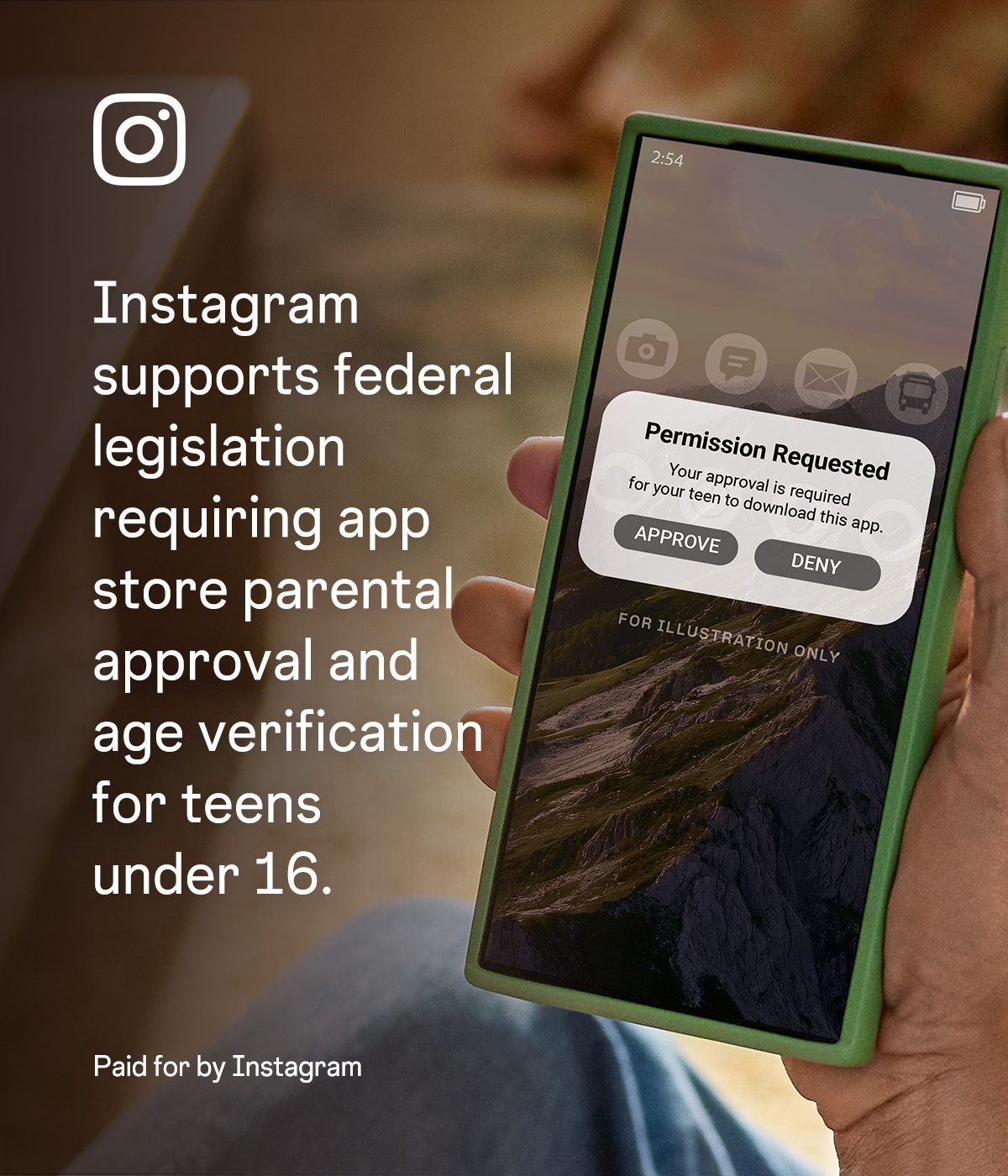Hello and welcome back to The Best & The Brightest. I’m Leigh Ann
Caldwell, no longer in the bottom tier of the Puck NCAA basketball bracket. It’s not over ’til it’s over!
Today, my partner Abby Livingston has the latest talmudic reading on the Democrats’ ongoing search for their identity. Interestingly, this journey has taken an unusual detour: a general loosening-up, which is expressing itself in public displays of swearing, cringey social media posts, and the podcast circuit.
|
|
|
Congress can help keep teens safe with app store parental approval.
3 of 4 parents agree that teens under 16 shouldn’t be able to download apps without their approval.
Federal legislation requiring app store parental approval and age verification for teens under 16 would put parents in charge of teen app downloads – and help them keep teens safe.
Learn more.
|
|
|
- House vs. Senate warfare: There might be a Republican trifecta, but that doesn’t mean it’s been all unicorns and rainbows. Tensions between the scrappy House and the ponderous Senate are as old as the Congress itself—and this morning, that tension increased among Republicans, complicating their efforts to pass Trump’s agenda.
A cocky House G.O.P. leadership team, impatient with the deliberative upper chamber, sent Senate Republicans a public
message via the media, calling on them to pass the House-approved version of the budget framework—an outline that allows $4.5 trillion for an extension of the Trump tax cuts and includes a minimum of $1.5 trillion in spending cuts. The statement, which came from Speaker Mike Johnson, Leader Steve Scalise, Whip Tom Emmer, and relevant chairs of committees noted that “the American people gave us a mandate and we must act on it. We encourage our
Senate colleagues to take up the House budget resolution when they return to Washington.”
This letter, of course, will do absolutely nothing to change the upper chamber’s course, I’m told. Senate Republicans do not appreciate being lectured by the House. And while many in the body applaud Johnson for passing his budget framework with such a slim House majority, they point out that he did so by making promises that will be difficult to keep. This is a theme I keep coming back to because
it’s hard to have a conversation about Johnson with a Republican who’s not worried about how the speaker is going to keep his word on spending cuts and taxes. The implication is that Johnson punted the hard work for later.
Some Republicans I spoke to acknowledged that the Senate can be cumbersome, maybe overly methodical, but said they’re trying to formulate a bill that can pass, while addressing the needs of its members and Trump. For example, there are more than 200
requests from G.O.P. senators for tax provisions to be included, none of which can be included in Johnson’s version of the framework based on how he wrote it. Also, of course, the Senate doesn’t like to be told what to do.
It’s worth noting that the snarky House statement came the day before Johnson and Senate Majority Leader John Thune are set to meet to talk about the reconciliation process. What could have been a very productive meeting—and it still could
be—may have just gotten more interesting.
- New phone, who dis?: As all of Washington (and most of New York, and even a few people in L.A.) know by now, the Trump administration’s top national security officials used the encrypted but still not completely secure Signal platform to coordinate the recent attack on the Iran-backed Houthis in Yemen. We know this because they accidentally added The Atlantic’s editor-in-chief,
Jeffrey Goldberg, to the chat.
Democrats are pouncing, lambasting Trump’s national security team for gross and dangerous incompetence, and calling on Republicans to hold investigations. “If you were up in arms over unsecured emails years ago, you should certainly be outraged by this amateurish behavior,” Chuck Schumer said on the Senate floor, referring to then-Secretary of State Hillary Clinton’s use of a private server
for classified information, which Trump used as a main campaign issue in 2016. (Clinton posted on X today, “You have got to be kidding me.”)
Democrats, who have been perilously adrift when it comes to finding a unifying message to counter Trump, won’t be letting this one go, hoping to build a larger case that the Elon-inflected administration is reckless and inept. But Republicans are unlikely to investigate, and Trump is unlikely to admonish participants on the chat, who
included J.D. Vance, Secretary of State Marco Rubio, and National Security Advisor Mike Waltz. If there’s any internal fallout, it might be between Trump and Vance, who wrote in the group chat that Trump’s directive to bomb the Houthis, ostensibly to protect Red Sea shipping lanes from missile attacks, amounted to a misguided bailout for cargo ships from Europe.
|
And now, on to the main event…
|
|
|
Field notes from the Democrats’ evolving identity crisis—the
emphasis on authenticity, cringey social media campaigns and all.
|
|
|
Among the many terrifying changes foisted upon Democrats since Donald
Trump’s victory in November has been the need to loosen up. Four years too late, Democrats are wondering how the party of the working class came to be viewed as the party of the managerial class, led by Ivy League grads on one side and Ivy League student activists on the other—a movement that cares more about message discipline and avoiding wrongspeak than actually appealing to voters.
Naturally, Democrats are taking a studious and somewhat scripted
approach to unleashing their id. There were the “choose your fighter” TikTok videos a few weeks ago, featuring House Democrats like Katherine Clark, A.O.C., and Jasmine Crockett throwing air punches for the camera, set to music from Street
Fighter. Chuck Schumer and Elizabeth Warren, among some 20 other Democrats, all posted identical “shit that ain’t true” selfie-style videos, as my partner Peter Hamby covered last month. Both efforts were mocked, but at least people were talking about them.
|
|
|
App store parental approval can keep teens safe online.
Today, teens can download any app – even ones parents don’t want them to. Federal legislation that puts parents in charge of app downloads could change that, helping keep teens safe.
That’s why Instagram supports federal legislation requiring app store parental approval and age verification for teens under 16.
Learn more.
|
|
|
Meanwhile, some House and Senate members have been forcing themselves onto the
podcast circuit or experimenting with swearing in public. “It’s not about avoiding cringe, or even avoiding criticism,” explained Christina Reynolds, a former Obama staffer and longtime campaign veteran. “No Democrat is going to get it all right, so let’s take a lesson from Trump and just communicate more.”
The pivot to spontaneity is a noteworthy departure from the iron-fisted comms control of yesteryear. Former Obama press secretary
Robert Gibbs once described himself as still having “tire tracks from Nancy Pelosi” after admitting in 2010 that Democrats would probably lose the House that fall. But that consensus has been fracturing for about a decade, as a new generation of Democratic politicians like A.O.C. started using
social media to reach voters directly and make themselves famous in the process—providing proof of concept that consultant-speak wasn’t necessarily the way to voters’ hearts. (Pennsylvania Senator John Fetterman has been helping to normalize swearing and short pants since 2023.)
Now, members are being encouraged to take risks—posting impromptu videos, and engaging more with unfriendly media outlets beyond Morning Joe and the Times bubble. Last week,
Colorado Democratic Rep. Jason Crow appeared on Fox & Friends host Brian Kilmeade’s radio show and made the rounds in other conservative outlets. Then, of course, there’s Gavin Newsom’s recent adventures in podcasting with Steve Bannon and Charlie Kirk. Senator Adam Schiff told Jimmy Kimmel on ABC last week that instead of “when they go low, we go high,” Trump could “go
fuck himself.”
Beyond the strategic rationale for loosening up, there’s also a therapeutic one: Democrats are clearly fighting off depression en masse, and I’m told that this potty-mouthed rumspringa has titillated junior staffers. One Hill staffer described to me how their boss “was very much a rule-follower and didn’t want to color outside the lines.” But the first two months of the Trump 2.0 administration got the member into “a breaking point of no-holds-barred”
rhetoric “in a language that’s not Congress member-y.” The staffer added: “That has been refreshing for [the boss] … It’s therapeutic in a way that’s productive.”
|
The inevitable paradox of trying to look natural and relatable is that trying
too hard lands you in cringe territory. “There’s a difference between younger members, who do this stuff themselves, [and] older members, who have staff help them,” said a Democratic chief of staff. But awkwardness is perhaps the price of comms innovation—and there are several genres of experimentation ongoing. Most prominent are the contrived skits and dance steps that go viral on TikTok and Instagram, the main adopter of which is Texas sophomore Jasmine Crockett.
Her edginess
is not everyone’s cup of tea in the caucus, particularly among vulnerable members. But her success has encouraged some of her elders to get more experimental. As one Dem chief put it, it’s okay to “be kitschy and viral, while also recognizing that you’re a serious federal policymaker.” (Virality can, of course, be achieved in moments of seriousness as well, as when Colorado’s Brittany Pettersen and California’s Kevin Mullin raced across the country to
cast ballots in the House budget vote—Pettersen with her newborn son in tow and Mullin using a walker after surgery.)
Meanwhile, Connecticut Sen. Chris Murphy has built much of his newfound political fame around
direct-to-camera videos in which he’s often wearing a baseball cap. (Cory Booker is also a major proponent of the form.) “The caucus and staff are all trying to convince members to do more direct-to-camera, off-the-cuff videos,” a House Democratic chief of staff told me, referring to a format popularized and arguably perfected by Ocasio-Cortez. Michigan freshman Sen. Elissa Slotkin has also taken to recording selfie-style videos, and some staffers I spoke to
credited the practice with helping her deliver her much-praised response to Trump’s joint address to Congress a few weeks ago.
|
|
|
Dems also praised Rosa DeLauro, the 82-year-old House
Appropriations leader—recall her brush with internet fame via an unaffiliated Tumblr website called “Rosa DeLauro is a F–ing Hipster”—who has embraced a social media campaign in which she has been clearly coached by younger staffers. Purple-haired and tattooed, she dances a fine line between cringe and
camp—but she seems to be in on the joke, so it all sorta works.
|
Amid all this experimentation, there hasn’t been much uniformity to the messages,
which can present its own risks. Take the difference between Slotkin’s response to Trump’s joint address and Al Green’s. Even before the president’s speech, sources around vulnerable Democratic members worried that a rambunctious member might have an outburst, and Green’s cane-waving at the dais realized those concerns. But other members of the anti-Trump coalition praised Green for showing some fight. Meanwhile, Slotkin dazzled much of the Democratic professional class
with her post-speech response, but many on the left felt betrayed by her positive invocation of Ronald Reagan.
Regardless, there’s growing consensus that the medium and style of communication is as important as the substance—an insight that’s driving the party’s generational divide. As it becomes clearer that older Democrats will face serious challenges in their primaries for the first time in years this cycle, we may see social media play a large role in their
futures. Many older members are in safe districts in big cities—places with expensive TV advertising markets. In these races, direct mail has long been the main channel of campaigning. But when older members have faced younger challengers in recent years, they’ve come under pressure to modernize their social media personas. When Ocasio-Cortez dethroned Joe Crowley, in 2018, TikTok was barely a blip on the radar. Today, being able to steal attention from Trump or
Musk is a necessity.
Of course, there are those who believe the party is overthinking all this. A former Senate staffer rolled their eyes at the rush to evolve. In this person’s worldview, a politician is either talented or they’re not, no matter the medium. “I’m very skeptical of anyone who thinks there needs to be some new way of communicating,” this person said. “People who have been stuck using careful talking points have always been bad communicators, and that’s not
new at all. People who have been engaging and empathetic communicators have been successful, and that’s not new, either.”
|
|
|
Join Emmy Award-winning journalist Peter Hamby, along with the team of expert journalists at Puck, as they let
you in on the conversations insiders are having across the four corners of power in America: Wall Street, Washington, Silicon Valley, and Hollywood. Presented in partnership with Audacy, new episodes publish daily, Monday through Friday.
|
|
|
Need help? Review our FAQ page or contact us for assistance. For brand partnerships, email ads@puck.news.
You received this email because you signed up to receive emails from Puck, or as part of your Puck account associated with . To stop receiving this newsletter and/or manage all your email preferences, click
here.
|
Puck is published by Heat Media LLC. 107 Greenwich St, New York, NY
10006
|
|
|
|




























